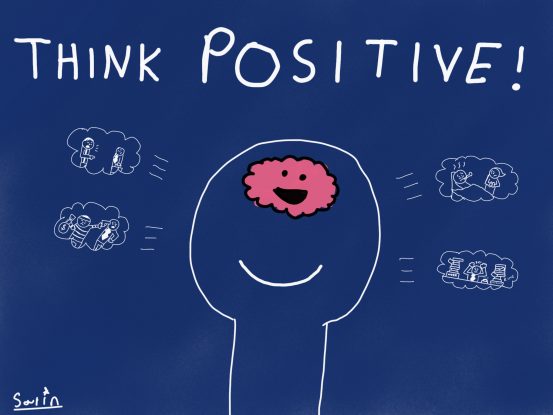The times are tough and many of us may struggle to stay optimistic amidst this pandemic. This crisis has extended for far longer than what most of us had anticipated at the beginning, which may also be diminishing our ability to think positive. People who normally look at the world as glass half-full might struggle to keep the same view and would start seeing it as glass half-empty. In such a scenario, it is crucial that we try and train our brain to think positive.
The definition per Kendra Cherry at Very Well Mind (2017B) –
“[P]ositive thinking actually means approaching life’s challenges with a positive outlook. It does not necessarily mean avoiding or ignoring the bad things; instead, it involves making the most of the potentially bad situations, trying to see the best in other people, and viewing yourself and your abilities in a positive light.”
 Let us first talk about why we need positive thinking:
Let us first talk about why we need positive thinking:
 Let us first talk about why we need positive thinking:
Let us first talk about why we need positive thinking:
- For better health: Positive thinking has power. It helps with better emotional health which reduces the vulnerability to mental disorders, depression and anxiety. In today’s life style and work-related stress, one has to think positive to avoid mental stress. Also, there is a deep biochemical connection between the mind and the body. Research shows that optimists enjoys better physical health than pessimists. Particularly, the risk of cardiovascular disease is less for optimists. A number of studies have also shown that a positive attitude can improve recovery and survival rate after surgery and also increase longevity.
- To be motivated: To achieve something, you need to apply effort and in order to apply effort, you need to be motivated. Motivation is therefore, the desire to do something, and without motivation it becomes hard to achieve your goals. Motivation has different levels and you must increase your level of motivation as you plan to achieve bigger and harder goals. Positive thinking helps when you want to attain a high level of motivation. Think of it this way – motivation is like a video game; the more you move to higher levels, your target/goal gets that much more tougher to achieve.
- For your self-esteem: It is about how you feel about yourself. If you don’t see yourself in a positive light, then everything around you will seem out-of-place. And your behavior will reflect that immediately. Everyone in the world is unique; you may be better at something than others and vice versa. If you start comparing yourself with others with a parameter where you could score low, you will always think less of yourself. So, you must think positively about all the good traits that you possess. Also, self-esteem has been shown to have a strong relation to happiness (refer ‘Maintaining Life Satisfaction: The Role of Positive Cognitive Bias’). In general, people with high self-esteem are happier than those with low self-esteem.
- For good relationships: There are vibes that others get when they spend time with you. People tend to be drawn to folks who give off a positive vibe. There is a certain aura that surrounds you when you start thinking positively. You start bringing energy and liveliness to your surroundings by your mere presence. This will help you build fruitful and long-lasting relationships.
- To be happy: Finally, thinking positive will make you happy. You don’t need to win a competition, or complete your goal, or even achieve something – in fact you don’t need to do anything explicitly to be happy. It’s all about your mind, and your attitude. If you train your mind to think positively, you can be happier. I believe happiness is a good enough reason to think positively, isn’t it?
- Self-talk: This is a technique where you talk to yourself as if you are someone else. You distance yourself from you – which is called ‘Self-Distancing’. This will lead you to think more objectively by regulating your emotions. According to a research by E. Kross and O. Ayduk from University of Michigan and University of California, Berkeley – self-reflection reduces the intensity of negative emotion. It helps focusing less on emotionally touching aspects of your negative experience and more on reengineering it in ways that provide you closure. So, distance yourself from yourself and shift from using ‘first-person’ to ‘third-person’ language (such as you, he, she). Engage with your other-you, with constructive self-talk that will reduce your stress and help you think positive.
- Let go: Don’t hold things tightly as all things will come to an end. Try to float your mind and not get too distracted during difficult situations. In life, we will be involved in hundreds of things that may go against our will, and we may get lost in a loop of worry and concern. Letting go is difficult. But we must learn to raise our level to a position where we can see a situation holistically and let go of stuff that weigh us down – physically and emotionally. This will open our path to positive thinking. Per, Thich Nhat Hanh, the Buddhist monk and peace activist – “I vow to let go of all worries and anxiety in order to be light and free.”In a corporate world, our mind is churning, thinking about the mountain of tasks facing us back at the office. We keep on checking our mobile and work email at the dinner table. We can’t sleep. One of the best ways to cut the thread, post office hours, is to let go of stuff and thinking positive, which will get us out of continuous anxiety and make us productive the next day.
- Talk Optimistic: Your environment and the way you approach people matters a lot in framing your mindset. Positivity and optimism are contagious. With positive thinking, you are a source of positive energy to the environment and the people that you interact with. No matter the situation, find a way to spin things optimistically. Frame your word in such a way that encourages positive thinking and action. You can express the same thing in completely different ways, eliciting two or more completely different reactions. So, practice to talk nice, talk positive.
- Do something that you cherish: People may have good memories of their past. Many of us must cherish some good moments of our childhood and our adolescent time. Life has changed a lot since then. It helps to think positive when we remember those events and do some of those old stuff that we used to at one point. Like writing letters using pen and paper, for instance. Try to write a letter to your parents or family members one day and see how it feels. Similarly, in a work environment, rather than sending a generic kudos e-mails, share a hand-written appreciation note to your fellow colleagues and you will see the difference.With age we get wiser; unfortunately, negativity creeps in unknowingly – that’s human nature. When things do not go according to plan, we tend to become pessimistic and develop a negative mindset. Will you do something the same way, exactly how you had done it 5 – 10 years ago? Probably not. The negative thought that you have inculcated will overpower your energy to think and act positively. The same person in you behaves in a different way than the younger you. This blocks positive thinking. So, give it a conscious try to do the same thing as you would have done when you were younger – which will help you think positive.
- “World-is-not-going-to-end-tomorrow” thinking: People are mostly worried about tomorrow. “What will happen if I can’t achieve this?”, “What will happen if I get laid off?”, “What will happen if….” This is generally what makes us cynical and grim. To come out of this, we must cultivate a mindset where we tell ourselves that no matter what happens, the world is not ending tomorrow. That will open your mind to start thinking about alternatives in a positive way.
- Don’t react; take a pause before responding: When one finds oneself in a difficult situation, the tendency is to react immediately. All the pent-up negative energy bursts like a volcano, and once it erupts it is difficult to undo the harm done. Positive thinking often gets suppressed by negative energy. You must forcefully stop yourself from reacting immediately. It may take a few seconds, but it is crucial that you control yourself for those initial few moments. After that, as each second passes by, you will find yourself incrementally thinking rationally and responding to a situation, rather than reacting to it.
- Surround yourself with positive people: There is a saying that goes “You Are Who Your Friends Are”, which means that it’s easy to judge a person by looking at the people they surround themselves with. You tend to imbibe the same attitude and traits that they display. So, to think positive, you must surround yourself with positive people. Spend time with people who are positive, supportive, and influence you positively.

